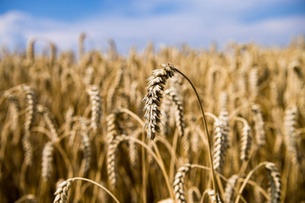Harvest figures are expected to droop somewhat after the 2018 drought. Bread wheat, barley, and rapeseed harvests look set to be considerably lower in Switzerland in 2018 compared to previous years, due to the prolonged heat and drought-like conditions this summer. The figures, collected by the Swiss granum organization, were based on data supplied by 29 cereal collection centres, covering 35% of the Swiss barley market, 50% of the bread wheat market, and 55% of the rapeseed market. With the harvests of the three cereals almost completed but not yet fully, the extrapolations for the yearly totals were estimated using last year’s trends. For bread wheat, 90% of which had been harvested at the time of the survey (early
Topics:
Swissinfo considers the following as important: 3) Swiss Markets and News, Business, Featured, newsletter
This could be interesting, too:
Nachrichten Ticker - www.finanzen.ch writes Die Performance der Kryptowährungen in KW 9: Das hat sich bei Bitcoin, Ether & Co. getan
Nachrichten Ticker - www.finanzen.ch writes Wer verbirgt sich hinter der Ethereum-Technologie?
Martin Hartmann writes Eine Analyse nach den Lehren von Milton Friedman
Marc Chandler writes March 2025 Monthly

Harvest figures are expected to droop somewhat after the 2018 drought.
Bread wheat, barley, and rapeseed harvests look set to be considerably lower in Switzerland in 2018 compared to previous years, due to the prolonged heat and drought-like conditions this summer.
The figures, collected by the Swiss granum organization, were based on data supplied by 29 cereal collection centres, covering 35% of the Swiss barley market, 50% of the bread wheat market, and 55% of the rapeseed market.
With the harvests of the three cereals almost completed but not yet fully, the extrapolations for the yearly totals were estimated using last year’s trends.
For bread wheat, 90% of which had been harvested at the time of the survey (early August), the estimated total for the year was put between 370,000 and 390,000 tonnes – down from the total of 412,000 tonnes collected in 2017.
Barley harvests are also expected to come in much lower; a 14% drop to 180,000 tonnes.
As for rapeseed, the difference looks set to be marginal – 74,000 tonnes as opposed to 76,000 – but may have been mitigated by the expansion of the volume of land being used for the crop in 2018.
The figures reflect a summer that has been marked by high temperatures and drought-like conditions throughout Switzerland, conditions that prompted the government to introduce emergency measures to help affected farmers.
In recent days, heavy rain and storms across much of the country has begun to alleviate the dangers caused by drought; in much of central Switzerland, on Tuesday, a general ban on fires in or near forest areas was partially lifted.
Tags: Business,Featured,newsletter
